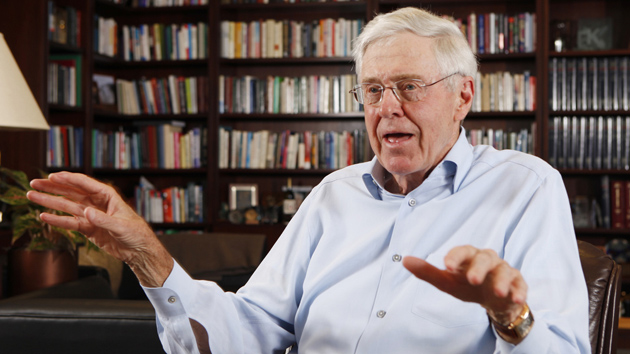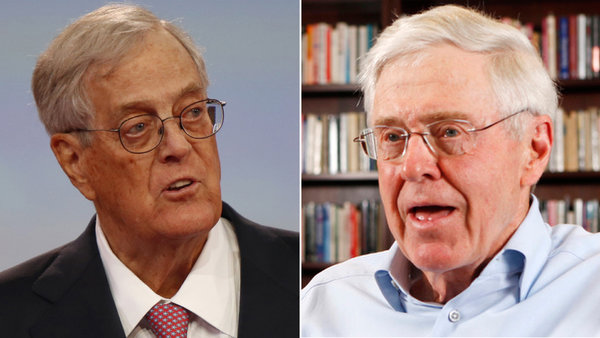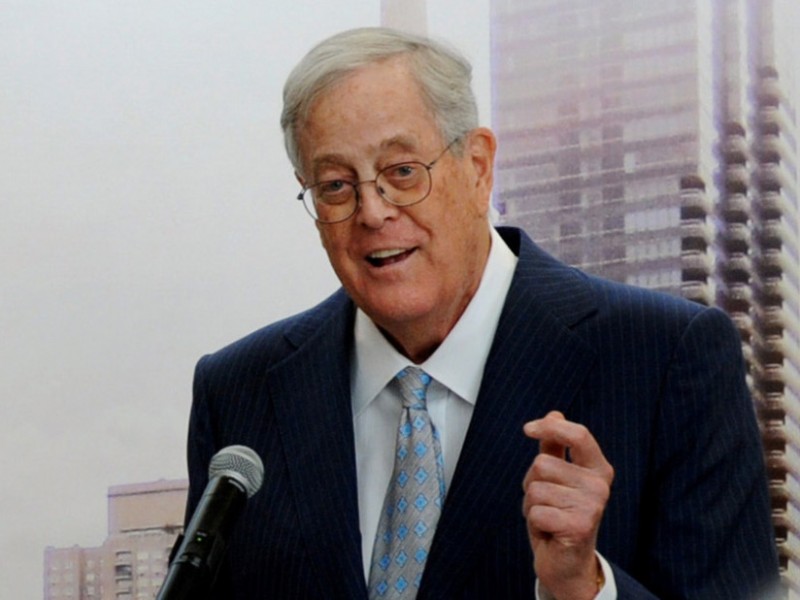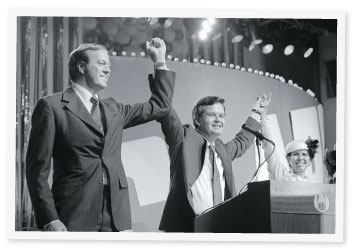At their most recent retreat in Southern California two weeks ago, the billionaire industrialists Charles and David Koch and 450 of their donor-allies announced plans to spend $889 million over the next two years to influence state and federal elections and shape the national discourse. The money would go to bankrolling political activity, funding think tanks and academic research, and fueling grassroots organizing efforts around the country—all in support of the Kochs’ pro-business, free-market-centric ideology. That eye-popping, nine-figure goal made national headlines, but what wasn’t reported was that the Kochs and their allies were already well on their way to banking that huge amount of money.
Donors at the Palm Springs confab pledged $249 million toward funding the Koch brothers’ grand plan, according to two sources with knowledge of the fundraising haul. A spokesman for Freedom Partners, the organization that hosts the donor summits and helps distribute the money raised at them, declined to comment. If the Koch network raises comparable sums at its remaining donor retreats between now and November 2016—it tends to hold two to three such gatherings a year—it will easily meet, if not surpass, its $889 million target.
The retreats—first hosted by the Kochs in 2003, when a mere 17 people attended—serve not only as strategy sessions but as showcases and fundraisers for an array of conservative and libertarian organizations, including more politically active outfits like Americans for Prosperity, wonky think tanks, and issue-based nonprofits focusing on veterans issues, health care, and seniors. Typically, toward the end of each retreat, donors gather for lunch and take turns pledging big amounts for Koch-backed causes.
If the Kochs hit their $889 million goal, it would more than double the $407 million raised by the brothers’ network during the previous presidential cycle. After all that spending failed to produce major gains for the GOP in 2012, donors were left scratching their heads—and blaming the Republican Party’s field of candidates, including presidential nominee Mitt Romney. But in the recent midterm elections, the Koch network reportedly set a $290 million target and ultimately fared far better, propelling conservative stalwarts, such as Iowa’s Joni Ernst and Arkansas’ Tom Cotton, to victory and helping the GOP retake control of the US Senate.
Now more than ever, elected officials, especially politicians with presidential aspirations, covet an invitation to appear at a Koch donor retreat. New Jersey Gov. Chris Christie spoke at the Kochs’ June 2011 event in Vail, Colorado. In his introduction of Christie, David Koch described the governor as “my kind of guy.” Ernst, a self-described “little-known state senator from a very rural part of Iowa” then running for US Senate, appeared at the Kochs’ summer 2014 retreat, and she thanked the people in attendance for helping drive her ascent, according to leaked audio of her remarks. “The exposure to this group and to this network and the opportunity to meet so many of you,” she said, “that really started my trajectory.”
At the most recent retreat, Wisconsin Gov. Scott Walker made an appearance, as did Sens. Marco Rubio (R-Fla.), Rand Paul (R-Ky.), and Ted Cruz (R-Texas). The three senators and possible GOP presidential contenders appeared together on a panel, moderated by ABC News’ Jonathan Karl and livestreamed to members of the media, and discussed domestic and foreign policy issues.
The Kochs surprised many with their decision to livestream the panel. In the past year, the notoriously private Kochs have tiptoed their way toward being more transparent about their plans. (The sources of their funding, however, will continue to remain mostly anonymous.) Freedom Partners, the group overseeing the Koch seminars, launched a super-PAC in 2014 that discloses all of its donors, and the brothers themselves and their top aides have recently given interviews to reveal some of their thinking.
If the Kochs hit their $889 million target, they will essentially function as a third party in US politics, and they can expect far greater scrutiny and criticism as their operation continues to grow. But those close to the brothers and their network do not expect them to be spooked by even more attention. “If you’re going to play in this arena, you don’t play only when it’s lukewarm, you play when it gets hot, too, and it’s gotten hot,” Nestor Weigand, a friend of Charles Koch and Freedom Partners board member, told Mother Jones editor and Koch biographer Daniel Schulman. “They’re still playing.”





'The Koch Brothers Raised $249 Million at Their Latest Donor Summit' have no comments
Be the first to comment this post!